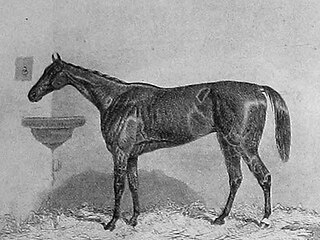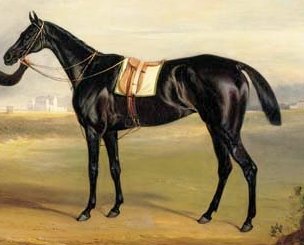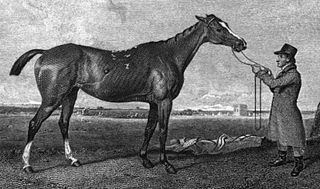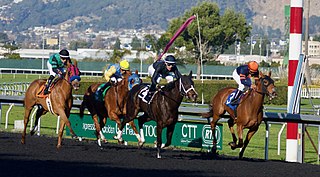Seeking The Gold was an American thoroughbred racehorse and a successful sire.
Khaled (1943–1968) was a British Thoroughbred racehorse best known as a sire in the United States. Bred and raced in England by the H. H. Aga Khan III, Khaled was sired by Hyperion, the 1933 Epsom Derby and St. Leger Stakes winner and a six-time Leading sire in Great Britain & Ireland. Hyperion was a son of 1918 English Triple Crown champion Gainsborough. Khaled was out of the mare Eclair, and his damsire, Ethnarch, was a son of The Tetrarch. The United Kingdom's National Horseracing Museum called The Tetrarch a "phenomenon" and reported that he was voted Britain's two-year-old of his century. In its description of the colt, the National Sporting Library's Thoroughbred Heritage website in the United States uses terminology such as "probably the greatest two-year-old of all time" and that he was "possibly the greatest runner ever."
Soaring Softly was an American Thoroughbred racehorse whose biggest win came in the 1999 Breeders' Cup Filly & Mare Turf. She originally raced on dirt, with limited success. Switched to turf at age four, she won seven of eight starts and was named the American Champion Female Turf Horse.

Virago (1851–1869) was a British Thoroughbred racehorse and broodmare. In a career which lasted from November 1853 to July 1855 she ran sixteen times and won eleven races. All but one of her victories came as a three-year-old in 1854, a year in which she dominated British racing, winning major events at distances ranging from one mile to three miles. Her wins included the classic 1000 Guineas at Newmarket, the Nassau Stakes and the Yorkshire Oaks against her own age and sex. More notable were her successes in open competition, including the Goodwood and Doncaster Cups and three of the season's most valuable handicap races. She was regarded by many British experts as one of the greatest racehorses of the 19th century.

Pussy was a Thoroughbred racehorse that won the 1834 Epsom Oaks. In a racing career that lasted from 1833 until 1837, Pussy started 25 times winning eight races. She initially raced under Thomas Cosby's name and was sold in 1835 to Lord Bentinck but raced under the Duke of Richmond's name. Pussy was retired to Bentinck's stud in 1837 but did not produce any noteworthy offspring. She was sold at auction in 1846, and her last foal was born in 1848.

Rockfel was a British Thoroughbred racehorse and broodmare, best known for winning two Classics in 1938. In a career which lasted from July 1937 until May 1939 she ran thirteen times and won eight races. Rockfel began her career at the lowest level, being beaten in a selling race, but improved to become recognised as one of the best British racemares of the 20th century. In 1938 she was the dominant three-year-old in England, winning the 1000 Guineas over one mile at Newmarket and the Oaks over one and a half miles at Epsom. In the autumn she defeated colts in the Champion Stakes and the Aintree Derby and was retired after winning her only race as a four-year-old. She produced one foal before dying in November 1941.

Rhoda was a British Thoroughbred racehorse and broodmare who won the third running of the classic 1000 Guineas at Newmarket Racecourse in 1816 and was the most successful racehorse in Britain two years later. Rhoda was one of the most active of all British classic winners, running in at least forty-five contests between 1816 and 1820 and winning twenty-one times. Her actual number of competitive races was even higher as many of her later races were run in multiple heats, with the prize going to the first horse to win twice. She won the 1000 Guineas on her second appearance but did not run as a three-year-old after finishing unplaced in the Oaks Stakes. Rhoda won three races in 1817, ten in 1818, four in 1819 and two in 1820.
Pelisse (1801–1810) was a British Thoroughbred racehorse who won the classic Oaks Stakes at Epsom Downs Racecourse in 1804. In a long racing career which lasted from April 1804 until April 1809 she had at least six different owners and ran thirty-five times, winning thirteen races and finishing second on eleven occasions. The Oaks was her second race and first win. In the succeeding years she competed at distances from five furlongs to four miles, racing mainly at Newmarket Racecourse, often in match races. She died in 1810, a year after being retired from racing.

Meteora (1802–1821) was a British Thoroughbred racehorse and broodmare who won the classic Oaks Stakes at Epsom Downs Racecourse in 1805. In a racing career which began with her win in the Oaks on 31 May 1805 and lasted until July 1810 she ran thirty-six timeas and won twenty-four races. She defeated the Derby winner Cardinal Beaufort and the St Leger winner Staveley in match races and won many other important races of the era including the Stamford Gold Cup, the Oatlands Stakes (twice), the Audley End Stakes, the Somerset Stakes and the Brighton Gold Cup. Many of her defeats occurred when she was carrying large weights in handicap races.
Bronze was a British Thoroughbred racehorse and broodmare who won the classic Oaks Stakes at Epsom Downs Racecourse in 1806. Bronze's classic win left her unbeaten in three starts, but her subsequent racing career was undistinguished: in eighteen more races she recorded only three wins, two of which were at relatively minor tracks. After being retired to stud in 1809 she proved to be a highly successful and influential broodmare, whose direct descendants have won many important races up to the present day.
Morel was a British Thoroughbred racehorse and broodmare who won the classic Oaks Stakes at Epsom Downs Racecourse in 1808. In a racing career which lasted from April 1808 until July 1812 the mare ran twenty-seven times and won fourteen races. She was mainly campaigned at Newmarket Racecourse, running against some of the best horses of the era in match races and frequently carrying large weights in handicaps. Unlike many champions of the early 19th century, she was particularly effective at shorter distances, recording many of her successes over a mile or less. After her retirement from racing, Morel became a highly successful and influential broodmare, whose direct descendants have won numerous major races in Europe, North America, Japan and Australasia.
Sorcery was a British Thoroughbred racehorse and broodmare who won the classic Oaks Stakes at Epsom Downs Racecourse in 1811. In a racing career which lasted from April 1811 to July 1814 the filly ran twenty-six times, winning twelve races and finishing placed on eleven occasions. Sorcery won the Oaks on her third racecourse appearance and went on to win other important races including the Epsom Gold Cup, the Trial Stakes, two editions of the Oatlands Stakes, a King's Plate and several match races. After her retirement from racing she became a successful broodmare, being the dam of the 1828 Epsom Derby winner Cadland.

Manuella was a British Thoroughbred racehorse and broodmare who won the classic Oaks Stakes at Epsom Downs Racecourse in 1812. Unraced as a two-year-old, the Northern-trained filly was fancied to win The Derby on her racecourse debut but finished unplaced. She won the Oaks a day later, but was beaten when favourite for the St Leger Stakes. She won two more races and changed hands more than once before being retired from racing at the end of the 1814 season. She was a successful and influential broodmare, whose direct descendants have won many important races.

Hannah was a British Thoroughbred racehorse and the second horse to win the English Fillies Triple Crown.

Untapable is an American Thoroughbred racehorse. She showed promise as a two-year-old in 2013 when she won two of her four races including the Pocahontas Stakes and was placed in the Starlet Stakes. In 2014 she emerged as a top-class racehorse, winning the Rachel Alexandra Stakes, Fair Grounds Oaks, Kentucky Oaks, Mother Goose Stakes, Cotillion Handicap and Breeders' Cup Distaff and was named American Champion Three-Year-Old Filly.
Judy the Beauty is a Canadian-bred, American-trained Thoroughbred racehorse. Bred by Adena Springs in Ontario, she has been owned and trained throughout her racing career by Wesley Ward who bought her for $20,000 as a yearling. As a juvenile, she won her first three races before finishing second in the Spinaway Stakes. In a brief three-year-old season she finished second in all three of her races. In 2013 she established herself as one of the best female sprinters in North America, winning the Thoroughbred Club of America Stakes and finishing second to Groupie Doll in the Breeders' Cup Filly & Mare Sprint. She was even better at five, winning the Las Flores Handicap, Madison Stakes and Rancho Bernardo Handicap before ending her season with a win in the Breeders' Cup Filly & Mare Sprint. After her retirement, Judy the Beauty was inducted into the Canadian Horse Racing Hall of Fame in 2018.
Kilijaro was an Irish-bred Thoroughbred racehorse and broodmare. She was the best filly of her generation in Ireland at both two and three years of age, winning the Phoenix Stakes and finishing second in the Queen Mary Stakes, Cheveley Park Stakes, Prix de l'Abbaye and Prix de la Foret. When transferred to France in 1980 she proved herself one of the best sprinter-milers of the year, with consecutive wins in the Prix de Meautry, Prix Quincey, Prix du Moulin and Prix de Seine-et-Oise before traveling to California to take the Yellow Ribbon Stakes. She remained in the United Stakes in 1981 and was one of the most successful female turf performers of 1981, winning the San Gorgonio Handicap, Monrovia Handicap, Gamely Handicap, Palomar Handicap, Autumn Days Handicap and Matriarch Stakes. After her retirement from racing she made little impact as a broodmare, but some of her descendants have won good races in Australia.
Bayuda was a British Thoroughbred racehorse and broodmare. As a two-year-old in 1918 she won the Cheveley Park Stakes and was placed in several other races against male opposition. In the following year she was beaten in the 1000 Guineas before recording an upset victory in the Epsom Oaks. Her racing career was ended by injury later that year. As a broodmare she produced very few foals, but exerted an enduring influence on the breed as the female-line ancestor of Sharpen Up.
Reve d'Or was a British Thoroughbred racehorse and broodmare who won two British Classic Races in 1887. She an nine times as a juvenile in 1886, winning three races including an upset victory in the Dewhurst Plate in October. In the following year she won nine races including the 1000 Guineas, Oaks Stakes, Sussex Stakes, York Queen's Plate, Yorkshire Oaks, Great Foal Stakes and Newmarket Oaks. She remained in training until the age of seven, winning the Jockey Club Cup in 1888 and the City and Suburban Handicap in 1890. She had limited success as a broodmare in France.

Mabs Cross is a British Thoroughbred racehorse. She did not compete as a two-year-old in 2017 and in the following year she ran mainly in minor sprint handicaps before being stepped up in class to win the Arran Scottish Fillies' Sprint Stakes on her final appearance of the season. In 2018 she made relentless improvement, winning the Palace House Stakes in spring and then being placed in the King's Stand Stakes and the Nunthorpe Stakes before recording her biggest success in the Prix de l'Abbaye.












